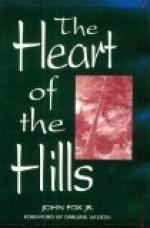With Four Illustrations By F. C. YOHN
In
grateful memory
of
my father
Who loved the great mother, her
forms,
her moods, her ways.
To the end she left him the joy
of youth
in the coming of spring
June 28, 1912.
THE HEART OF THE HILLS
I
Twin spirals of blue smoke rose on either side of the spur, crept tendril-like up two dark ravines, and clearing the feathery green crests of the trees, drifted lazily on upward until, high above, they melted shyly together and into the haze that veiled the drowsy face of the mountain.
Each rose from a little log cabin clinging to the side of a little hollow at the head of a little creek. About each cabin was a rickety fence, a patch of garden, and a little cleared hill-side, rocky, full of stumps, and crazily traced with thin green spears of corn. On one hill-side a man was at work with a hoe, and on the other, over the spur, a boy—both barefooted, and both in patched jean trousers upheld by a single suspender that made a wet line over a sweaty cotton shirt: the man, tall, lean, swarthy, grim; the boy grim and dark, too, and with a face that was prematurely aged. At the man’s cabin a little girl in purple homespun was hurrying in and out the back door clearing up after the noonday meal; at the boy’s, a comely woman with masses of black hair sat in the porch with her hands folded, and lifting her eyes now and then to the top of the spur. Of a sudden the man impatiently threw down his hoe, but through the battered straw hat that bobbed up and down on the boy’s head, one lock tossed on like a jetblack plume until he reached the end of his straggling row of corn. There he straightened up and brushed his earth-stained fingers across a dullred splotch on one cheek of his sullen set face. His heavy lashes lifted and he looked long at the woman on the porch— looked without anger now and with a new decision in his steady eyes. He was getting a little too big to be struck by a woman, even if she were his own mother, and nothing like that must happen again.
A woodpecker was impudently tapping the top of a dead burnt tree near by, and the boy started to reach for a stone, but turned instead and went doggedly to work on the next row, which took him to the lower corner of the garden fence, where the ground was black and rich. There, as he sank his hoe with the last stroke around the last hill of corn, a fat fishing-worm wriggled under his very eyes, and the growing man lapsed swiftly into the boy again. He gave another quick dig, the earth gave up two more squirming treasures, and with a joyful gasp he stood straight again—his eyes roving as though to search all creation for help against the temptation that now was his. His mother had her face uplifted toward the top of the spur;




